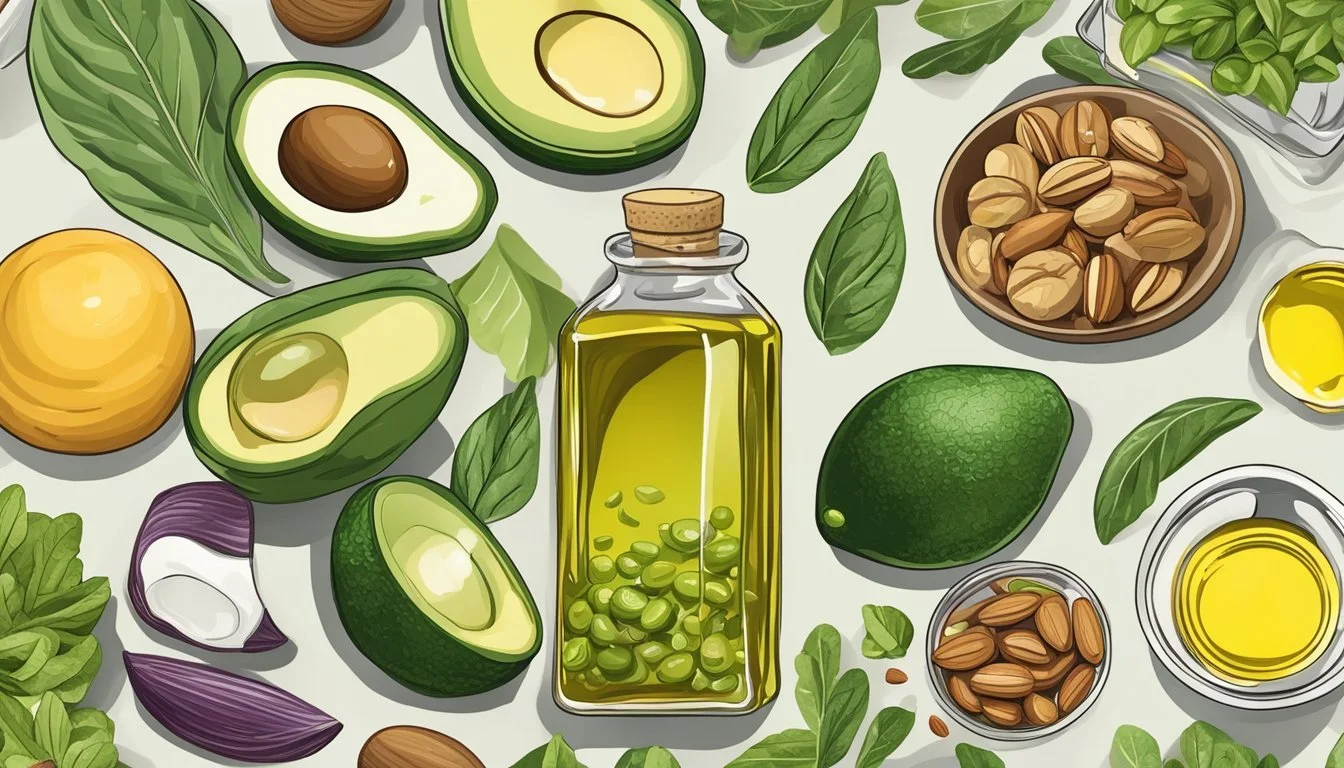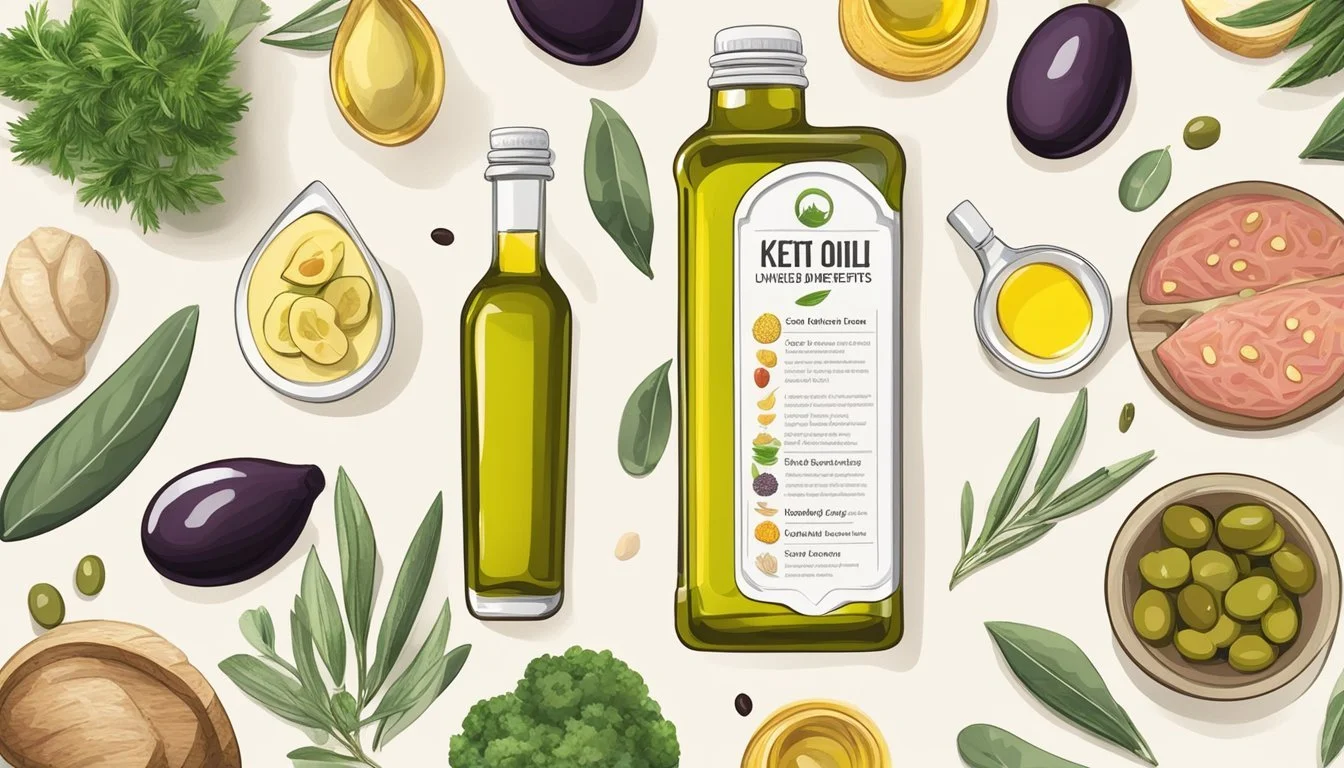Keto Diet: Olive Oil Benefits and Its Impact on Ketogenic Health
The ketogenic, or keto, diet is a low-carbohydrate, high-fat eating plan that has been associated with weight loss and several health benefits. Central to this diet is the consumption of healthy fats, which are pivotal in achieving ketosis, a metabolic state where the body burns fat for fuel instead of carbohydrates. Olive oil, with its high content of monounsaturated fats, particularly oleic acid, is an excellent fat choice for the keto diet.
Olive oil not only aligns with the keto diet's fat requirements but also contributes to the overall health benefits credited to this nutritional strategy. The oil is renowned for its role in the Mediterranean diet, which is linked to cardiovascular health and longevity. Moreover, it contains zero carbohydrates, which is essential for maintaining ketosis.
When incorporating olive oil into a ketogenic lifestyle, individuals gain a versatile ingredient that boasts an abundance of heart-healthy monounsaturated fats. These fats are essential to the diet's success and are conducive to reducing inflammation and potentially lowering the risk of chronic diseases. Olive oil's compatibility with keto underscores its status as a dietary staple for those looking to optimize their health while adhering to this high-fat, low-carb regimen.
Understanding the Keto Diet
The ketogenic diet is a nutritional strategy focused on high-fat intake and carbohydrate restriction, which systematically induces a bodily state known as ketosis.
Principles of Ketosis
Ketosis is a metabolic state where the body burns fat for fuel instead of carbohydrates due to a reduced intake of carbs. It is achieved when the body depletes its glucose reserves and begins to break down fatty acids resulting in the production of ketone bodies. These ketones become the primary source of energy, supporting fat loss and providing constant energy.
Benefits of High-Fat, Low-Carb Lifestyle
A high-fat, low-carb lifestyle, such as the ketogenic diet, has been shown to promote fat loss and may improve certain health markers. Diets rich in healthy fats—like those found in olive oil, avocado oil, and MCTs (Medium-chain triglycerides)—can aid in satiety and provide a sustained energy source. By reducing carbohydrates, the diet helps stabilize blood sugar levels, which can benefit individuals looking for weight management and those with diabetes.
Comparing Keto to Other Diets
Unlike diets that may allow moderate to high carbohydrate intake, the ketogenic diet strictly limits carbs to typically 20-50 grams per day, emphasizing fat consumption. This contrasts with low-fat diets or the Mediterranean diet, which includes a balance of macronutrients including higher levels of carbohydrates. What sets the ketogenic diet apart is its ability to induce ketosis, which none of the others aim for.
Please note that while this diet can have benefits, it may not be suitable for everyone, and individuals should consult with a healthcare professional before starting any new dietary regimen.
The Role of Fats in Keto
Fats play a central role in the ketogenic diet, serving as the primary energy source and influencing both health outcomes and ketosis. Ensuring a balance of different fat types can impact cholesterol levels and overall heart health.
Types of Dietary Fats
Dietary fats can be classified primarily into saturated and unsaturated fats. Saturated fats, typically solid at room temperature, can be found in foods like butter and coconut oil. Unsaturated fats, which are usually liquid, include monounsaturated and polyunsaturated fats, found in avocado oil, nut oils, and olive oil.
Saturated vs. Unsaturated Fats
Saturated fats contribute to the stability of cell membranes and support immune health, but they must be consumed in moderation to manage heart health. On the other hand, unsaturated fats, both monounsaturated and polyunsaturated, are deemed heart-healthy. Monounsaturated fats increase HDL ("good") cholesterol levels, while polyunsaturated fats include essential fatty acids that the body can't produce on its own.
Importance of Healthy Fat Sources
Selecting healthy fats is critical on a ketogenic diet. Sources of healthy fats like avocado oil and olive oil are favoured for their positive effects on heart health. Additionally, these fats play a substantial role in sustaining ketosis while maximizing health outcomes. Users should prioritize fats that support both ketosis and cardiovascular health.
Olive Oil in Focus
Olive oil is a cornerstone of the ketogenic diet, valued for its high-fat content and rich supply of monounsaturated fats. This section delves into the various types of olive oil, their nutritional make-up, and how olive oil compares with other dietary fats.
Types of Olive Oil
There are several grades of olive oil, each with unique characteristics and processing methods:
Extra Virgin Olive Oil (EVOO): Made from pure, cold-pressed olives, (What wine goes well with olives?) it’s the highest quality and contains the richest flavors. EVOO is an excellent source of antioxidants and monounsaturated fats, specifically oleic acid, which support ketogenic dietary goals. Importantly, EVOO has a moderate smoke point, making it suitable for low to medium-heat cooking.
Virgin Olive Oil: A step below EVOO, it is less refined with a slightly higher acidity level, but still retains most of the flavor and health benefits.
Refined Olive Oil: Chemically treated to neutralize strong tastes and acidity, which results in less flavor and fewer nutrients.
Pure Olive Oil: Usually a blend of refined olive oil and virgin olive oil, offering a balanced flavor and a higher smoke point than EVOO.
Nutritional Profile of Olive Oil
Olive oil's nutrition is noteworthy due to its fat composition:
Monounsaturated Fats: Predominantly composed of monounsaturated fats which can help support heart health.
Vitamin E: A natural antioxidant that is essential for healthy skin and immune function.
Antioxidants: Contains significant amounts of antioxidants, which help combat oxidative stress.
Notably, olive oil contains no carbohydrates, making it ideal for maintaining ketosis.
Olive Oil vs. Other Fats
When considering fats for a keto diet, olive oil stands out for several reasons:
Monounsaturated Fats: Olive oil is rich in monounsaturated fats like oleic acid, unlike other oils high in polyunsaturated fats which are more prone to oxidation.
Smoke Point: Extra virgin olive oil has a smoke point between 350°F and 410°F, making it suitable for most cooking methods, though not as high as refined oils like avocado oil which can withstand higher temperatures.
Nutrient Profile: Olive oil offers a blend of vitamins, antioxidants, and healthy fats without the carbohydrates present in other food sources, aligning with the nutritional requirements of a ketogenic lifestyle.
In summary, olive oil's nutritional profile and versatility make it a superior choice for those on a ketogenic diet, providing health benefits while helping maintain ketosis.
Health Benefits of Olive Oil
Olive oil, particularly extra virgin olive oil, is rich in monounsaturated fats and contains a unique composition of beneficial compounds. These contribute to its health-promoting properties, especially when integrated into a ketogenic diet.
Cardiovascular Health
Olive oil is associated with reducing the risk of heart disease due to its high content of monounsaturated fats, which can help to lower levels of LDL cholesterol, known as the "bad" cholesterol. Research suggests that incorporating olive oil into one's diet can be a heart-healthy choice, as it also contains antioxidants that may protect the cardiovascular system.
Anti-Inflammatory Effects
The anti-inflammatory effects of olive oil are largely attributed to compounds such as oleocanthal, which behaves similarly to ibuprofen, an anti-inflammatory drug. Chronic inflammation is a risk factor for many diseases, and the anti-inflammatory properties of olive oil may help reduce this risk.
Cancer and Disease Prevention
Olive oil's antioxidant properties, courtesy of compounds such as polyphenols, play a role in cancer prevention. Antioxidants neutralize harmful free radicals, which can otherwise contribute to cancer development. Additionally, the monounsaturated fats in olive oil may protect against insulin resistance, benefiting those at risk for type 2 diabetes.
Monounsaturated fats: May lower risk of heart disease and stabilize cholesterol levels.
Oleocanthal: Provides anti-inflammatory effects and may reduce the risk of chronic diseases.
Polyphenols: Antioxidants that support cancer prevention and overall health.
Incorporating Olive Oil into a Keto Diet
Olive oil is a staple in the ketogenic diet due to its high-fat content and health benefits. It serves as a versatile fat source that can easily be integrated into daily cooking and meal preparation.
Keto-Friendly Cooking with Olive Oil
When cooking on a keto diet, extra virgin olive oil is preferred for its purity and high levels of antioxidants. It is ideal for:
Sauteing: Its resistance to moderate heat makes it suitable for sautéing vegetables and meats.
Baking: For a keto-friendly baking substitute, olive oil can replace traditional fats in recipes.
Roasting: The robust flavor of olive oil complements the natural taste of roasted keto vegetables and proteins.
Salad Dressings and Marinades
Olive oil is an essential component of keto salad dressings and marinades:
Salad Dressings: Combine olive oil with vinegar, lemon juice, or spices to create a simple yet flavorful dressing.
Marinades: Olive oil can be the base of marinades, enhancing the flavors of meats and vegetables without adding carbs.
Olive Oil as a Flavor Enhancer
As a flavor enhancer, olive oil adds a depth of flavor to keto dishes:
Drizzle over finished dishes to accentuate flavors.
Mix with herbs and spices to create dips and sauces that complement a keto meal plan.
Practical Tips for Using Olive Oil
Incorporating olive oil into a ketogenic diet can yield significant health benefits. However, maximizing these benefits depends on choosing the right oil, storing it properly, and understanding the labeling system that differentiates various grades and qualities.
Choosing Quality Olive Oil
When selecting olive oil, extra virgin olive oil (EVOO) is the premium choice due to its minimal processing and high content of beneficial antioxidants. One should look for the Mediterranean origin, where some of the best EVOO is produced. The color of the oil can range from a robust green to a milder golden shade, but the color is not an indicator of quality. Instead, focus on purity and avoid oils labeled as "light" or "blend," as they are often mixed with lower-quality oils and do not offer the same health benefits.
Pureness: Ensure the oil is 100% olive oil with no other oils mixed in.
Filtering: Unfiltered oil may contain sediments that can affect flavor and shelf life.
Processing: Cold-pressed or cold-extracted olive oil ensures that the oil's natural aromas and flavors are well-preserved.
Storing and Preserving Freshness
For optimal freshness, olive oil should be stored in a cool, dark place away from heat sources like the stove. Light and heat can deteriorate the oil's quality, so many high-quality EVOO products come in dark glass bottles or tin containers. After opening, it is best to use the oil within six months for maximum flavor and health benefits.
Temperature: Store below room temperature, ideally between 57°F (14°C) and 63°F (17°C).
Container: Dark-colored bottles or tin containers protect against light deterioration.
Sealing: Ensure the container is tightly sealed after each use to keep oxygen out.
Understanding Labels and Grades
The label on the bottle provides crucial information about the grade, origin, and certification of the olive oil. Grades, such as "Extra Virgin" or "Virgin," indicate the level of acidity and the degree of processing the oil has undergone.
Extra Virgin Olive Oil: Often abbreviated as EVOO, this grade has the highest standards for flavor and aroma; it has no more than 0.8% acidity.
Virgin Olive Oil: Slightly lower grade than EVOO with mild flavor, suitable for cooking, and has acidity up to 2%.
Pure or Refined Olive Oil: Heavily processed, often mixed with a small amount of EVOO for flavor; not truly pure despite the name.
By understanding how to select, store, and interpret olive oil labels, consumers can ensure they are integrating the healthiest and most flavor-rich oils into their ketogenic diet.
Common Keto Recipes Featuring Olive Oil
Olive oil serves as a cornerstone in many keto diet recipes due to its high healthy fat content and versatility in both cooking and flavor enhancement.
Low-Carb, High-Fat Meals
In keto cooking, olive oil is frequently used for its ability to complement meats and vegetables, enriching their flavors while contributing to the diet's necessary fat intake. It's common in recipes like:
Grilled Chicken: Marinated with olive oil, herbs, and spices, it offers a hearty dose of protein and fats.
Roasted Vegetables: Vegetables such as broccoli or Brussels sprouts coated in olive oil, seasoned, and roasted until crispy.
For salads, a simple dressing can be made by whisking together olive oil, vinegar, and a selection of herbs and cheeses such as parmesan or feta, aligning with the principles of a balanced keto diet aimed at weight loss.
Keto Snacks and Condiments
Olive oil is not only reserved for main dishes; it plays a pivotal role in keto-friendly snacks and condiments:
Keto Mayonnaise: A stable emulsion of quality olive oil with egg, mustard, and lemon juice, ideal for dipping low-carb vegetables.
Flavored Oils: Infused with garlic or chili, these oils are perfect for adding a punch to snacks like cheese slices.
By incorporating olive oil into these dishes, those on a ketogenic diet can maintain their low-carb, high-fat nutritional goals without sacrificing taste. The use of cooking oil that is supportive of ketosis makes olive oil a staple for anyone following this dietary plan.
Potential Challenges and Considerations
Incorporating olive oil into a ketogenic diet can present challenges related to caloric balance, understanding diet mechanics, and managing food sensitivities. These aspects require careful consideration to harness the benefits of olive oil without undermining diet objectives.
Managing Caloric Intake
Olive oil, while beneficial for its high monounsaturated fat content, is calorie-dense. Individuals on the ketogenic diet, which emphasizes low carb and high fat intake, should monitor their olive oil consumption to maintain a caloric deficit if weight loss is a goal. One tablespoon of olive oil contains approximately 120 calories; these can quickly add up.
To control calories, it is recommended to:
Measure olive oil servings accurately.
Consider olive oil's caloric contribution in the context of other dietary fats.
Addressing Common Misconceptions
The ketogenic diet's reduction of carbohydrates can lead to misconceptions, such as the idea that all fats are equally beneficial. While olive oil is rich in omega-3 fatty acids, which are supportive of the gut microbiome and overall health, not all fats offer the same advantages. Consumers should understand the distinct health profiles of various fats and oils.
Key misconceptions to correct include:
All fats have the same impact on health.
The ketogenic diet negates the need to monitor types of fat intake.
Allergies and Intolerances
While not common, some individuals may experience allergies or intolerances to olive oil or other fat sources recommended for a ketogenic diet. Recognizing and addressing potential allergic reactions is crucial for maintaining overall well-being.
Signs of allergies can include:
Skin reactions such as hives.
Gastrointestinal discomfort after consuming certain oils.
For those with sensitivities, alternative fat sources may be necessary, such as:
Avocado oil: An alternative with similar health benefits.
Coconut oil: A common ketogenic-friendly oil, though it may not be suitable for all due to its distinct flavor and potential allergenic properties.
Conclusion
Olive oil, with its content rich in monounsaturated fats, aligns well with the principles of the keto diet. As a healthy source of fat, it can enhance the fat intake necessary for maintaining ketosis. The keto lifestyle demands high-fat intake, and including olive oil is a judicious choice for adherents.
Health Benefits: Olive oil offers a range of health benefits. Its monounsaturated fatty acids are renowned for supporting heart health. Moreover, the presence of antioxidants contributes to its anti-inflammatory properties.
Integration into Keto Diet:
Salad Dressings: Olive oil serves as an excellent base for keto-friendly salad dressings.
Cooking Medium: Its stability at high temperatures makes it suitable for cooking keto meals.
Direct Consumption: A spoonful of olive oil aids in meeting daily fat requirements.
The ketogenic diet has been embraced by many for its potential to support weight management and improve metabolic health. When incorporated responsibly, olive oil can significantly enrich one's keto journey. Its versatility in cooking and the numerous health benefits it provides make it a valuable addition to a keto dieter's pantry.
In conclusion, those following a ketogenic lifestyle will find olive oil to be an ally in their quest for health. It is essential, however, to consume it in moderation as part of a balanced diet.






